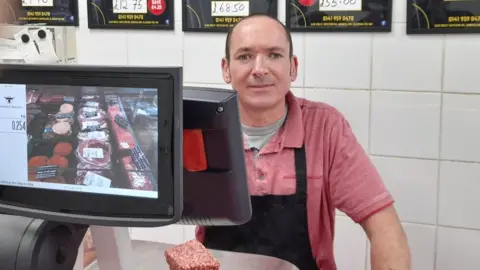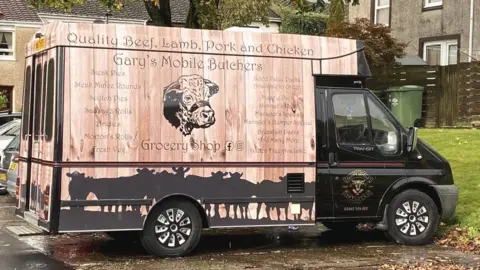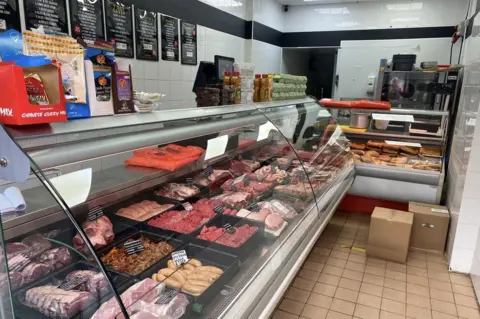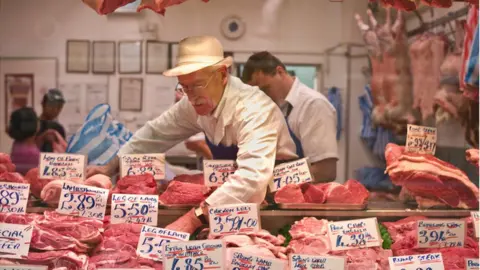Cost of living crisis: I'm going on the road to save my butcher's shop
Residents in Glasgow housing estates could soon be hearing the sound of mooing cows and clucking hens outside their homes.
With his business facing closure amid the cost of living crisis, butcher Gary Peline is set to take to the road in what is a modern-day rarity - a mobile butcher's shop.
But rather than opting for the standard ice cream van chimes, he's set up speakers to blare out the sound of farm animals.
"There are several animals on it but mostly I'll just use the cow," he says.
"There's a horse, a pig and a chicken. There's even a turkey - that would work for Christmas!
"Maybe if I have a wee special on with whole chickens, I could throw in the chicken noises that day. It's a bit of fun - I'm a fun kind of person."

Despite his sense of humour, the past year has been anything but a joke for Gary, who has been battling to keep his shop open in Glasgow's Anniesland district.
A slump in footfall this year has left him struggling to pay the bills in order to keep going.
"Basically it is ghost town around my shop," he says.
"Since I opened seven years ago, they've closed the local job centre, the social work department, three banks and a pub. That turns a lot of people away from the area."
His business has been battered from all directions, forcing him to lay off all his staff and reduce opening hours.
His shop's electricity bill has virtually doubled to £500 a month, and he's had to increase prices to cover steep rises in the cost of meat and ingredients.
"Meat prices have climbed dramatically, and a lot of the raw ingredients for sausages have really rocketed," he says.
"You used to be able to make a beef sausage quite cheaply. Now, you can't because the price of a bag of rusks has gone up by over 40%, and the price of seasoning has gone up by 35% to 40%.
"Every time you go to buy stock, the prices have gone up."
 Gary Peline
Gary PelineGary believes people generally are tightening their belts as a result of the cost of living crisis, but has another explanation for the lack of footfall he has experienced.
"I believe Covid created a lazy society where people learned to shop online and they never reverted back from it," he says.
"They are quite happy to sit in their houses and go on their iPads, phones, computers and order things online."
Gary says he came up with the idea of a mobile butcher shop "on a whim", and invested the last of his savings on a second-hand fully kitted-out van from Wales.
He has since had to spend thousands of pounds on repairs and a bespoke livery.
 Gary Peline
Gary PelineGary has put his shop up for sale but doesn't expect any takers anytime soon. He plans to keep it going, at least until his lease runs out in just over a year's time.
He says: "I want to go click-and-collect from the shop. If I'm out in the van, I'll still need to be supplied, so I will need a couple of workers in the shop to produce stuff and keep the van stocked and supplied."
In the meantime, he has applied for trading licences in Glasgow and Renfrewshire so he can start hitting the road early in the new year.
Gary's challenge in keeping his business afloat is likely to chime with local independent butchers across the country.
Trade body Scottish Craft Butchers says all businesses have had to cope with increased costs for ingredients, energy and transport in the last few months.
 Getty Images
Getty ImagesChief executive Gordon King says many butchers have received "eye-watering" quotes from energy suppliers, including one "average-sized" business in the Borders which is facing a four-fold annual increase, to £200,000.
"The only option to counterbalance that is to try to increase the amount of customers, which is difficult as consumers have financial pressures, and it increases labour and energy costs," he says.
"Or they can try to cut back on energy usage, which is almost impossible for food producers as the energy is needed to not only produce safe food but to store it under the legal temperature requirements.
"If none of this is an option to our members, like many other high street businesses, then closure of the business looms large."
On a positive note, Mr King says local butchers in Scotland have always adapted to change.
'Demand is out there'
"It is also true that we are seeing some new businesses opening and some are expanding," he says.
"It can be difficult to pass on the extra costs to the consumer but existing businesses are working harder to maintain the customer base."
Meanwhile, Gary is confident he can make a success of his new venture.
"I think there is a demand out there in housing schemes, and I think it will benefit the elderly and disabled who can't get out to the shops," he says.
"If they've got a wee van coming around and they can get their mince and stew, or whatever, it benefits everybody."
He adds: "You have the fish vans and the ice cream vans so why wouldn't the butcher's van work?
"I think in the summer, people will be sitting in their gardens, the alcohol flowing, and say: 'There's the butcher's van, let's grab some burgers for the barbecue'."
